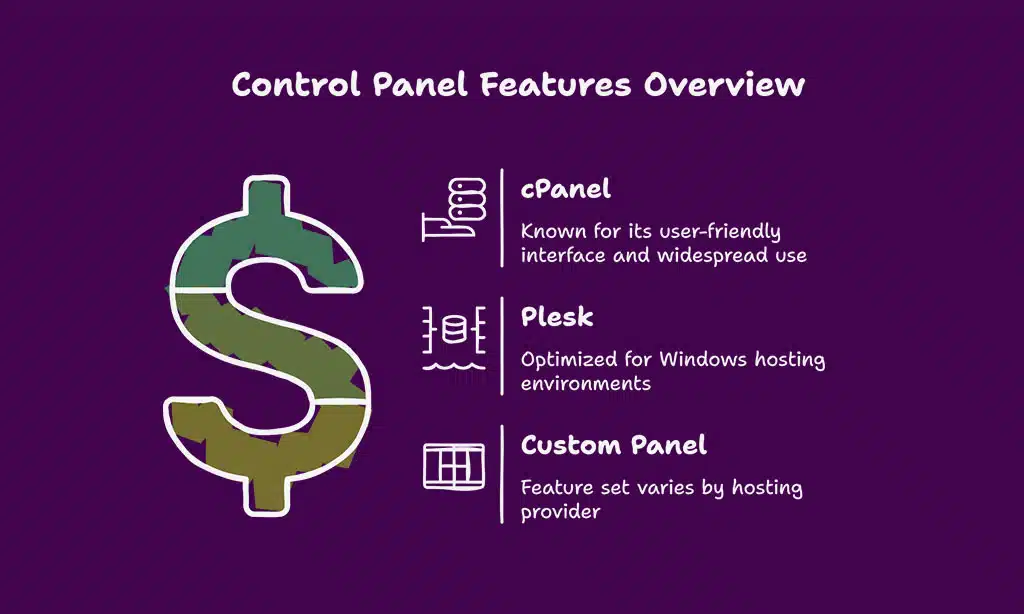Choosing a web host isn’t just about finding a place to store your website’s files; it’s about ensuring speed, security, uptime, and seamless functionality. A web host acts as the backbone of your online presence, influencing SEO rankings, user experience, and overall website success.
Your hosting provider affects everything from customer trust and conversion rates to page speed and site reliability. Research shows that a 1-second delay in load time can lead to a 7% drop in conversions, 11% fewer page views, and a 16% decrease in customer satisfaction.
Additionally, Google’s Core Web Vitals update has made site performance a critical ranking factor, reinforcing the importance of choosing the right web hosting solution.
But how do you select the best web host? Here, we break down the 10 key features every good web host should offer, ensuring your website runs smoothly, securely, and efficiently.
Why Choosing the Right Web Host Matters?
- A fast-loading website improves user retention and decreases bounce rates.
- Poor hosting can lead to server crashes, which frustrate visitors and cost businesses revenue.
- A reliable web host ensures a smooth user experience, essential for online stores, blogs, and business websites.
SEO and Security Considerations
- Google prioritizes websites with high uptime and fast page speed.
- A secure website builds trust and prevents data breaches.
- SSL certificates, malware scanning, and DDoS protection are crucial.
Key Factors to Evaluate in a Web Hosting Provider
| Factor | Importance |
| Uptime Guarantee | Ensures your site is always accessible |
| Security Features | Protects from hacking, malware, and data theft |
| Customer Support | Assists in resolving technical issues quickly |
| Scalability | Supports business growth and traffic surges |
| Performance | Determines page speed and user experience |
Now, let’s explore 10 Key Features Every Good Web Host Should Offer in detail.
10 Key Features Every Good Web Host Should Offer
Choosing a reliable web hosting provider is essential for ensuring your website runs smoothly, remains secure, and performs optimally. With numerous hosting options available, it’s important to focus on key features that impact speed, uptime, scalability, and security. A good web host should provide a strong infrastructure, top-notch customer support, and advanced security measures to keep your site running efficiently.
Whether you are launching a new website or considering switching providers, understanding these essential hosting features will help you make an informed decision.
Below, we explore the 10 key features that every good web host should offer to guarantee a seamless and reliable hosting experience.
1. High Uptime Guarantee for Maximum Availability
A web host’s uptime guarantee ensures your website remains accessible at all times. A 99.9% uptime guarantee means your site is down for only 43 minutes per month. Lower uptime can severely impact eCommerce sales, lead generation, and brand reputation.
Industry Standard Uptime Rates
| Hosting Provider | Uptime Guarantee | Annual Downtime |
| Bluehost | 99.9% | ~8.8 hours |
| SiteGround | 99.99% | ~53 minutes |
| A2 Hosting | 99.9% | ~8.8 hours |
Case Study: Uptime Impact on Business
Amazon faced an hour-long outage in 2018, resulting in an estimated $100 million loss. Even small businesses suffer—a downtime of 1 hour can cost up to $10,000 depending on traffic volume.
2. Fast Loading Speeds and Performance Optimization
Website speed affects SEO rankings, user experience, and sales. Google reports that a 2-second delay in load time increases bounce rates by 50%, which can result in significant traffic loss.
Research from Akamai found that 53% of mobile users abandon sites that take longer than 3 seconds to load, underscoring the need for optimized hosting solutions. Furthermore, Google’s Core Web Vitals update emphasizes loading speed as a critical ranking factor, making performance optimization essential for SEO success.
Factors Affecting Site Speed
| Factor | Impact on Speed |
| SSD Storage | Up to 300% faster than HDD |
| Content Delivery Network (CDN) | Reduces load time by 50% for global users |
| Server Location | The closer the server, the faster the load time |
Example: How Speed Affects Conversions
Walmart found that for every 1-second improvement in page load time, conversions increased by 2%.
3. Strong Security Measures for Website Protection
Cyber threats are on the rise, with over 30,000 websites hacked daily, affecting businesses of all sizes. Studies show that 43% of cyberattacks target small businesses, emphasizing the need for robust security measures.
A good web host should provide SSL certificates to encrypt data, firewalls to block unauthorized access, daily malware scanning to detect vulnerabilities, and DDoS protection to prevent server overloads.
In addition, some premium hosts offer AI-driven security systems that proactively identify and neutralize potential threats before they escalate.
Essential Security Features
| Security Feature | Purpose |
| Free SSL | Encrypts user data to prevent hacking |
| Daily Malware Scans | Detects and removes threats before they cause harm |
| DDoS Protection | Prevents attacks that crash your site |
4. Scalability and Resource Flexibility
As your website grows, your hosting plan should be able to scale accordingly. A flexible hosting provider allows you to upgrade from shared hosting to VPS or dedicated servers without hassle. Scalability ensures that your site can handle increased traffic, expanding databases, and additional functionalities without compromising performance.
Some hosting providers also offer auto-scaling solutions, dynamically adjusting resources based on demand to prevent slowdowns during peak traffic periods.
Additionally, cloud hosting options provide on-demand scalability, making them ideal for businesses with fluctuating resource requirements.
Comparison of Hosting Types
| Hosting Type | Best For | Scalability |
| Shared Hosting | Small blogs & personal sites | Limited |
| VPS Hosting | Growing businesses | High |
| Dedicated Hosting | Large enterprises | Maximum |
5. Reliable Customer Support and Technical Assistance
When a website issue arises, quick support response time is essential. Delayed responses can lead to prolonged downtime, frustrated visitors, and potential revenue loss. Top hosting providers offer 24/7 customer support via chat, phone, and email, ensuring that technical issues are resolved swiftly.
Additionally, some premium hosts provide priority support tiers, dedicated account managers, and AI-powered chatbots to enhance user experience.
A well-structured knowledge base with troubleshooting guides can also help users fix minor issues independently, reducing the need for direct assistance.
Customer Support Response Times
| Provider | Live Chat Response Time | Phone Support |
| Bluehost | ~2 minutes | Yes |
| SiteGround | ~1 minute | Yes |
| Hostinger | ~30 seconds | No |
6. User-Friendly Control Panel and Dashboard
Managing your website should be intuitive and easy, even for beginners. A well-designed control panel allows users to manage domains, databases, emails, and security settings without needing technical expertise. The best hosting providers offer cPanel, Plesk, or custom dashboards, each with distinct advantages.
cPanel is widely used and beginner-friendly, offering features like one-click installations and automated backups. Plesk is great for Windows hosting, with strong developer tools and automation options.
Some hosts provide custom dashboards, which may offer enhanced usability or unique features tailored to their hosting environment.
Comparison of Control Panels
| Control Panel | Features |
| cPanel | User-friendly, widely used |
| Plesk | Great for Windows hosting |
| Custom Panel | Varies by provider |
7. Free Domain, Email, and Essential Add-Ons
A good hosting provider should offer free extras that add value and convenience while reducing additional costs for users. These can include free domain registration, SSL certificates, automated backups, business email accounts, and website builders.
Having these features bundled in a hosting plan eliminates the need for separate purchases, saving time and money.
Furthermore, top-tier hosts often provide free website migrations, which are particularly beneficial for users switching from one provider to another without technical hassle.
Key Free Add-ons
| Add-on | Benefit |
| Free Domain | Saves ~$10–$15/year |
| Business Email | Looks professional |
| Automatic Backups | Ensures data security |
8. Affordable Pricing and Transparent Billing
Hidden fees are a common issue in the hosting industry and can significantly increase long-term costs. Many hosting providers advertise low introductory prices but impose steep renewal rates, unexpected add-on charges, or non-refundable setup fees.
Always check renewal costs, add-on pricing, and refund policies before purchasing to avoid surprises. Additionally, read the fine print on contract terms, as some providers require multi-year commitments for the best pricing.
A transparent hosting provider should clearly disclose all costs upfront and offer flexible payment plans to suit different budget needs.
Pricing Breakdown
| Provider | Intro Price | Renewal Price |
| Bluehost | $2.95/mo | $9.99/mo |
| SiteGround | $3.99/mo | $14.99/mo |
9. Website Backup and Disaster Recovery Options
Frequent backups are crucial to ensure website data remains protected against cyber threats, server failures, or accidental deletions. A good web hosting provider should offer automated backup solutions with easy restoration options.
A reliable backup system should include multiple retention points, allowing users to roll back to previous versions if needed. Some hosting providers also offer manual backup options for added control.
Backup Features
| Backup Type | Advantage |
| Daily Backups | Ensures the latest version is available |
| One-Click Restore | Allows quick recovery |
10. Easy Website Migration and Transfer Assistance
Switching web hosts should be a seamless process without the risk of downtime or data loss. The best hosting providers offer free site migration services to assist users in transferring their website files, databases, and email accounts without hassle.
When choosing a hosting provider, it’s essential to check their migration policies, the number of free migrations allowed, and whether they offer assistance for complex websites, such as eCommerce platforms.
Hosting Migration Services
| Provider | Free Migration? |
| SiteGround | Yes |
| Bluehost | No |
| Hostinger | Yes |
Final Words
Choosing the right web hosting provider is one of the most critical decisions for your website’s success. It impacts everything from speed and security to overall performance and user experience. A well-chosen host ensures smooth website operation, minimizes downtime, and enhances customer trust.
Additionally, features like automatic backups, free SSL certificates, and easy website migration simplify website management and growth.
By opting for a web hosting service that offers these 10 key features, you create a future-proof and scalable foundation for your website. Whether you’re running a personal blog, an eCommerce store, or a business website, investing in a reliable host ensures optimal performance, security, and long-term success in the digital world.
Take the time to compare different providers and choose the one that aligns with your needs, budget, and growth plans.







































